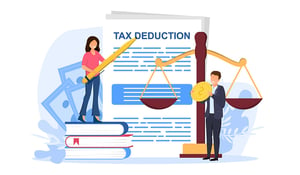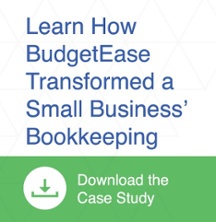 We receive a lot of interesting questions about deductions. Recently, the deductibility of a pet was a topic of conversation. The scenario is a dog who “works” alongside his person who happens to be a truck driver. The dog (named Clutch) is outfitted in company gear and takes his job of protecting the driver very seriously. Clutch is also in charge of client relations and makes sure to woo all customers with his adorable demeanor. Despite his clear value in company operations, Clutch’s expenses are unfortunately not considered deducible by the IRS.
We receive a lot of interesting questions about deductions. Recently, the deductibility of a pet was a topic of conversation. The scenario is a dog who “works” alongside his person who happens to be a truck driver. The dog (named Clutch) is outfitted in company gear and takes his job of protecting the driver very seriously. Clutch is also in charge of client relations and makes sure to woo all customers with his adorable demeanor. Despite his clear value in company operations, Clutch’s expenses are unfortunately not considered deducible by the IRS.
So, What Expenses Are Deductible?
Fortunately, there are a lot of expenses you can deduct, below are the major ones to be mindful of.
Bank and Merchant Fees – Annual and monthly charges by your bank or credit card are deductible. Many small businesses use third-party payment processors (i.e. Stripe or PayPal) that charge a fee associated with a sale. Merchant fees are deductible and should be categorized accordingly. In our experience, most small businesses are not managing merchant fees properly and therefore are losing valuable deductions.
Advertising & Promotion - Monies spent on logos, social media, your website, or sponsoring an event are deductible expenses.
Business Meals – In order to deduct a meal, a business owner or employee must be present at the meal. Additionally, the expense cannot be exorbitant (you don’t need to go to the most expensive restaurant for a meeting) and must be a necessary part of conducting your business.
Automobiles – If the car is used solely for business, you can use deduct the entire cost of operating the vehicle (fuel, maintenance, licensing, etc.). If the vehicle is used for personal and business use, you can either deduct the mileage (for 2022, it’s $0.585 per mile), OR you can track all costs associated with operating the vehicle and deduct those. Costs include, maintenance, lease payments, insurance, registration, etc. To use this method, you need to add up the expenses and multiply them by the number of business miles driven. Of mention, you must pick one method and stick to it for the year--you cannot switch once you start.
Depreciation – The purchase of furniture, equipment, software, or other fixed assets can be deducted. Generally, you spread the expense over the useful life of the asset; however, you can expense the entire item during the year if the asset cost is less that $2,500. There is also Bonus Depreciation, where a business can write off up to 100% of the cost of an eligible property purchase after September 2016 and before January 2023.
Education – Learning opportunities that add value to your business by increasing your expertise are fully deductible. Examples included classes, workshops, seminars and webinars, subscriptions to professional or trade organizations, books related to your industry, and transportation to and from classes or workshops.
Contract Labor – Fees paid to independent contractors or freelancers are deductible. If you pay a contractor $600 or more, you are required to send them a 1099-NEC by January 31st of the following year.
Home Office – There are two ways of deducting expenses associated with using a home office. You can use the simplified method where you deduct %5 per square foot of your home used for business (up to 300 sq. feet). The alternate method is referred to as the Standard Method. Using the Standard Method, all actual expenses for maintaining your home are tracked (mortgage interest or rent, utilities, landscaping, real estate taxes, repairs, association fees, and housekeeping). To qualify for the Standard Method, you must regularly use your home office, have a defined work area, and it must be the principal place of business. In other words, you can’t sit at your kitchen table and occasionally engage in business activities.
Interest – Interest on credit cards or loans are deductible.
Salaries & Benefits – Wages, benefits, and paid time off are deductible if the employee’s salary is reasonable and necessary, and the employee is not a sole proprietor, partner, or LLC member.
Rent – Rent paid for a location or for equipment used in your business (copy machines, postage machines, etc.) is deductible.
Taxes & Licenses – There are various taxes that you can deduct including State Income Tax, Payroll Tax, Sales Tax, Excise Tax, Fuel Taxes, Personal Property Tax, and Real Estate Tax paid on a business property.
Utilities – Payments made for telephone, internet, cell phone (the business portion), electric, natural gas, and security are deductible expenses.
Travel – Costs associated with business travel are deductible. Expenses include transportation by air, car, bus, or train. Also deductible are meals and lodging while traveling, parking and tolls, laundry or dry cleaning while on a business trip, and shipping of materials or luggage.
Deductions for Business Owners
 These deductions are normally taken on a business owner’s personal return and include:
These deductions are normally taken on a business owner’s personal return and include:
Child and Dependent Care – Costs associated for the care of a child or dependent (under age 13) are permitted between 20 to 35% of your allowable expense based on income.
Retirement Contributions – Contributions made to employee retirement accounts are often deducted, depending on the type of retirement plan you have.
Contributions – If you are a sole proprietor, LLC, or have a partnership, you can deduct charitable contributions on your personal tax return.
Health Care – Insurance premiums and out-of-pocket medical costs are normally deducible if you are a business owner.
Keep On Top of Your Deductions
There are a lot of moving parts to owning a small business. Deductions are one of the many things you must manage. Solid bookkeeping can help you stay organized and capture expenses. At BudgetEase, we stay on top of changing tax laws to make your business as profitable as possible.
If you need help understanding what you can deduct, or just need help with your bookkeeping, reach out to us at www.budgetease.biz.






